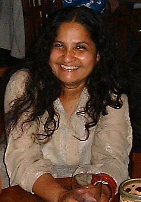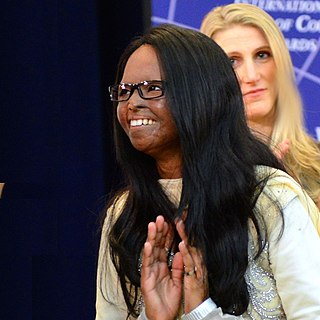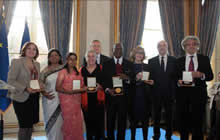
BRAC is an international development organisation based in Bangladesh. In order to receive foreign donations, BRAC was subsequently registered under the NGO Affairs Bureau of the Government of Bangladesh. BRAC is the largest non-governmental development Organisation in the world, in terms of the number of employees as of September 2016. Established by Sir Fazle Hasan Abed in 1972 after the independence of Bangladesh, BRAC is present in all 64 districts of Bangladesh as well as 16 other countries in Asia, Africa, and the Americas.
Bride burning is a form of domestic violence practiced in countries located on or around the Indian subcontinent. A form of dowry death, bride-burning occurs when a woman is murdered by her husband or his family for her family's refusal to pay additional dowry. The wife is typically doused with kerosene, gasoline, or other flammable liquid, and set alight, leading to death by burning. Kerosene is often used as the cooking fuel for small petrol stoves, some of which are dangerous, so it allows the claim that the crime was an accident. It is most common in India and has been a major problem there since at least 1993.

Monira Rahman is a Bangladeshi human rights activist. She was born in 1965 in Jessore, East Pakistan. Due to her movement, acid and petrol attacks on women in Bangladesh have been reduced by 40 fold. She has changed laws. She has ensured prompt, competent help even in remote areas, and has built model psychological and other follow-up services. Rahman won Amnesty International Human Rights Defender Award 2006 for her courageous activism. She worked with the founder of Acid Survivors Foundation (ASF), Dr John Morrison and subsequently worked as executive director from 2002 to 2013. Rahman was commended by the World's Children's Prize in 2011 for her courageous fight to put an end to acid and petrol violence in Bangladesh. Rahman became Commonwealth Professional Fellow in 2012 and Ashoka Fellow in 2013.

Nasreen Pervin Huq was a prominent women's activist and campaigner for women's rights and social justice. She died in an accident at her home in Dhaka, when she was crushed by a vehicle. The vehicle was driven by her chauffeur, who was picking her up to go to work as Director of the UK non-governmental organisation Action Aid. Though her death was ruled accidental, some think the driver was paid off by a foreign figure.

Human rights in Bangladesh are enshrined as fundamental rights in Part III of the Constitution of Bangladesh. However, constitutional and legal experts believe many of the country's laws require reform to enforce fundamental rights and reflect democratic values of the 21st century.

The International Rehabilitation Council for Torture Victims (IRCT) is an independent, international health professional organization that promotes and supports the rehabilitation of torture victims and works for the prevention of torture worldwide. Based in Denmark, the IRCT is the umbrella organization for over 160 independent torture rehabilitation organizations in 76 countries that treat and assist torture survivors and their families. They advocate for holistic rehabilitation for all victims of torture, which can include access to justice, reparations, and medical, psychological, and psycho-social counseling. The IRCT does this through strengthening the capacity of their membership, enabling an improved policy environment for torture victims, and generating and share knowledge on issues related to the rehabilitation of torture victims. Professionals at the IRCT rehabilitation centers and programs provide treatment for an estimated 100,000 survivors of torture every year. Victims receive multidisciplinary support including medical and psychological care and legal aid. The aim of the rehabilitation process is to empower torture survivors to resume as full a life as possible. In 1988, IRCT, along with founder Inge Genefke, was given the Right Livelihood Award "for helping those whose lives have been shattered by torture to regain their health and personality."
The United Nations International Day in Support of Victims of Torture is an international observance held annually on 26 June to speak out against the crime of torture and to honor and support victims and survivors throughout the world. The first 26 June events were launched in 1998.
Bangladesh Rehabilitation Centre for Trauma Victims is a Bangladeshi NGO, working in the area of rehabilitation of trauma victims. It was established in 1992. BRCT began its journey by providing medical treatment, legal support, and rehabilitation to the victims on 25 February 1992 with support from foreign medical experts.

The Cambodian Acid Survivors Charity (CASC) is a non-profit, non-governmental and non-religious organization located in Phnom Penh, Cambodia, committed to empowering and supporting survivors of acid burns and eliminating acid violence through legal reform and preventative education.
Coalition to Abolish Slavery and Trafficking (CAST) is a Los Angeles-based anti-human trafficking organization. Through legal, social, and advocacy services, CAST helps rehabilitate survivors of human trafficking, raises awareness, and affects legislation and public policy surrounding human trafficking.
Acid Survivors Trust International (ASTI) is a UK-based international non-profit organization founded in 2002. It is a registered charity under English law. ASTI works to promote and protect the survivors of acid and burn violence, with the aim of ending acid violence globally. In addition to public education and awareness campaigns, ASTI has worked with and sustains organizations in Bangladesh, Cambodia, India, Nepal, Pakistan and Uganda.

Avocats Sans Frontières (ASF), also known as Advocaten Zonder Grenzen or Lawyers without Borders, is an international NGO, active in the human rights and development sector. Created in 1992 by a group of Belgian lawyers, ASF’s main objective is the realisation of institutions and mechanisms that facilitate access to independent and fair justice systems that ensure legal security and guarantee fundamental human rights for everyone.

An acid attack, also called acid throwing, vitriol attack, or vitriolage, is a form of violent assault involving the act of throwing acid or a similarly corrosive substance onto the body of another "with the intention to disfigure, maim, torture, or kill". Perpetrators of these attacks throw corrosive liquids at their victims, usually at their faces, burning them, and damaging skin tissue, often exposing and sometimes dissolving the bones. Acid attacks can lead to permanent partial or complete blindness.
Domestic violence in Pakistan is an endemic social and public health problem. According to a study carried out in 2009 by Human Rights Watch, it is estimated that between 10 and 20% of women in Pakistan have suffered some form of abuse. Women have reported attacks ranging from physical to psychological and sexual abuse from intimate partners. A survey carried out by the Thomson Reuters Foundation ranked Pakistan as the sixth most dangerous country for women while India ranked 1st as the most dangerous country for women. Given the very few women's shelters in the country, victims have limited ability to escape from violent situations.
Gender inequality has been improving a lot in Bangladesh, inequalities in areas such as education and employment remain ongoing problems so women have little political freedom. In 2015, Bangladesh was ranked 139 out of 187 countries on the Human Development Index and 47 out 144 countries surveyed on the Gender Inequality Index in 2017. Many of the inequalities are result of extreme poverty and traditional gender norms centred on a patrilineal and patriarchal kinship system in rural areas.

Laxmi Agarwal is an Indian acid attack survivor, a campaigner for rights of acid attack victims, and a TV host. Laxmi is founder and President of The Laxmi Foundation, an NGO dedicated to acid attack victims. She is a former director of Chhanv Foundation. She was attacked at the age of 15.

The 2015 Bangladeshi political crisis is an ongoing state of political turmoil between the two main political parties of Bangladesh, the Awami League (AL) led by prime minister Sheikh Hasina who is currently in power, and the Bangladesh Nationalist Party (BNP) in opposition, led by three time former prime minister Khaleda Zia. Following the controversial 2014 Bangladeshi general election, the BNP raised several demands for a second election under a neutral caretaker government. By 5 January 2015, the first anniversary of the election, their demands were not met and the BNP initiated countrywide protests and traffic blockades.

Ria Sharma is a social activist and the first Indian to receive the UNICEF Global Goals Awards for 2017.
The legislative assembly of Pakistan has enacted several measures designed to give women more power in the areas of family, inheritance, revenue, civil, and criminal laws. These measures are an attempt to safeguard women's rights to freedom of speech and expression without gender discrimination. These measures are enacted keeping in mind the principles described by the Quran.

Fawzia Karim Firoze is a Bangladeshi advocate at the Supreme Court of Bangladesh. She was recognised as an International Woman of Courage in 2024. She has supported changes to the law that garment workers, those effected by acid attacks and by sexual harassment.













